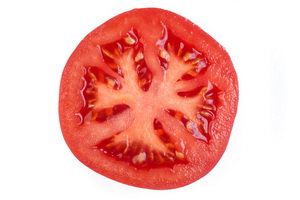
Scientists Characterize CRISPR Mutants Targeting Genes Modulating Pectin Degradation in Ripening Tomato
January 9, 2019| |
 Shelf life is one of the most important quality traits of tomato linked to modifications in cuticle properties and remodelling of the fruit cell walls. Previous studies have shown that a range of pectin degrading enzymes are involved in cell wall remodelling, which mostly involved only one gene.
Shelf life is one of the most important quality traits of tomato linked to modifications in cuticle properties and remodelling of the fruit cell walls. Previous studies have shown that a range of pectin degrading enzymes are involved in cell wall remodelling, which mostly involved only one gene.
An international team of scientists reported in Plant Physiology the successful generation of CRISPR-based mutants in the ripening-related genes encoding the pectin degrading enzymes pectate lyase (PL), polygalacturonase 2a (PG2a) and β-galactanase (TBG4). When they compared the physiochemical properties of the fruits from a range of PL, PG2a and TBG4 CRISPR lines, it was found that only mutations in PL led in firmer fruits, although mutations in PG2a and TBG4 affected fruit color and weight. Investigation on pectin localization, distribution, and solubility in the pericarp cells of the CRISPR mutant fruits showed that PL, PG2a and TBG4 act on separate cell wall domains and the importance of cellulose microfibril-associated pectin is reflected in its increased occurrence in the different mutant lines.
Read the research article in Plant Physiology.
| |
Biotech Updates is a weekly newsletter of ISAAA, a not-for-profit organization. It is distributed for free to over 22,000 subscribers worldwide to inform them about the key developments in biosciences, especially in biotechnology. Your support will help us in our mission to feed the world with knowledge. You can help by donating as little as $10.
-
See more articles:
-
News from Around the World
- 2020 Proclaimed International Year of Plant Health by UN General Assembly
- Forecast: Global Agri-biotech Market Size to Grow Significantly in the Next 4 Years
- Scientists Engineer Shortcut for Photosynthetic Glitch, Boosting Crop Growth by 40%
- USDA: No GMOs Detected, No Labeling
- Adoption of Biotech Crops Crucial in Pakistan
- SEARCA BIC Releases Policy Briefs on GM Crops
- Chinese Agri Ministry Approves Import of 5 GM Crops
- ISAAA Announces New SEAsiaCenter Director
- Structure and Function of Photosynthesis Protein Explained in Detail
-
Research Highlights
- GM Potato Shows Improved Colorado Potato Beetle Resistance
- Bt Maize Expressing a Fusion Gene Cry1Ab/Cry1Ac Does Not Harm Pollen Feeders
-
Beyond Crop Biotech
- Researchers Develop GM Houseplants to Clean Air
-
Resources
- Trending News on Crop Biotech in 2018
-
Plant
- CRISPR-Cas9 Used to Modify Seed Morphology Traits in Wheat
- Scientists Characterize CRISPR Mutants Targeting Genes Modulating Pectin Degradation in Ripening Tomato
-
Read the latest: - Biotech Updates (April 17, 2024)
- Gene Editing Supplement (April 10, 2024)
- Gene Drive Supplement (February 22, 2023)
-
Subscribe to BU: - Share
- Tweet
